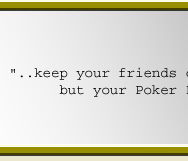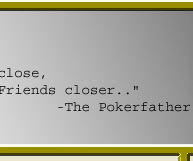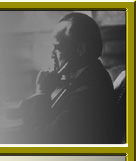(Click Here for the Latest Online Poker News Stories)
HEADLINE: Business Sues US Department
of Justice Over Efforts to Stop Online
Gaming Ads
BODY:
On August 9, 2004, Casino City Inc.
filed a lawsuit against the U.S. Department of Justice in the
U.S. District Court for the Middle District of Louisiana. The
complaint seeks a declaratory judgment that advertising online
casinos and sportsbooks is constitutionally protected commercial
free speech under the First Amendment of the United States. n1
n1 Casino City, Inc. v. U.S. Department of
Justice, U.S. Dist. Ct., M.D.La., C.A. No. 04-557-B-M3.(available
at http://Online.CasinoCity.com/FirstAmendment).
The background to the suit, as explained by
the plaintiff, is that in June 2003 the Department of Justice
sent letters to a variety of organizations, including the National
Association of Broadcasters, the Magazine Publishers of America,
the Independent Press Association, and the National Newspaper
Association. The letters requested the organizations warn their
members that individuals accepting such advertisements might be
prosecuted.
Several months later the Department of Justice
issued subpoenas to a variety of media outlets, internet portals,
public relations firms, and other companies seeking detailed information
on the purchase and placement of online casino and sportsbook
advertisements. n2
n2 See Casino City Files Against U.S. Department
of Justice to Establish First Amendment Right to Advertise Online
Casinos and Sportsbooks, Aug. 9, 2004 (http://Online.CasinoCity.com/FirstAmendment).
As a result of the Justice Department actions,
which the media has reported widely, popular internet portals,
including Google and Yahoo have recently stopped accepting advertising
for online casinos and sportsbooks. Some people in the online
gambling industry perceive the Justice Department's actions as
a form of blackmail based on the belief of a few government officials
rather than established legal principles.
Casino City's parent corporation has been involved
in the gaming industry for years. In 1995, it created the original
gaming portal site, CasinoCity.com.
Casino City, Inc. operates the website and is the most popular
such site on the web concerning online
casinos and sportsbooks, land-based casinos, gaming
strategy, and news. It belongs to a network of websites including
Online.CasinoCity.com devoted to online gaming, and www.CasinoCityTimes.com
covering gaming news and offering visitors thousands of article
on gaming strategy.
The complaint by Casino City brings into focus
the legality and appropriateness of the Justice Department's warnings
that entities and individuals placing advertisements for offshore
sportsbooks and online casinos may be violating various state
and federal laws, including 18 U.S.C. § 1084, 1952, and 1955,
and the warning that the individuals or entities that accept and
place such advertisements may be aiding and abetting illegal activities,
a Class E felony, pursuant to 18 U.S.C. § 2.
According to the complaint, the Justice Department's
letter and its issuance of subpoenas have created a fear of prosecution
within the advertising community, resulting in a chilling effect
upon the exercise of free speech. In particular, the complaint
alleges that a number of internet advertising portals based in
the U.S. have stopped accepting advertising of legal casino and
sports betting. n3
n3 Complaint, supra note 1, at 12.
Some of Casino City's revenues come from the
sale and running of advertisements on its informational internet
sites for lawful overseas companies that offer online
casino or sportsbook gambling. The sale and placement of the
advertisements is not illegal under Louisiana law. The complaint
avers that the advertisements are not misleading and concern lawful
activity. n4
n4 Id. at 14, 15.
According to the complaint Casino City does
not conduct or participate in online casino or sportsbook activities.
It does not knowingly accept, in payment for operating online
casino or sportsbook advertisements, proceeds that come from illegal
bets, deposits or wagers placed by persons located in the U.S.
or anywhere worldwide. The complaint contends Casino City has
"taken reasonable steps to ensure that such proceeds are
not received." n5
n5 Id. at 16.
The complaint cautions that the advertisements
that Casino City sells and runs are of the same content and nature
as those that the Justice Department warned may constitute the
offense of aiding and abetting. n6 The complaint contends that
the U.S. does not have a substantial interest sufficient to justify
imposing on the exercise of free speech resulting from its action
and threatened actions and that such threatened actions would
not effectively serve any purported government interest. Finally,
the complaint argues the government action is not narrowly drawn
to effectuate any purported government interest.
n7
n6 Aiding and abetting would violate 18 U.S.C.
§ 1084, 1952 and/or 1955.
n7 Id., 18.
Most likely, the U.S. government will argue
that the case may not be ripe for decision insofar as the plaintiff
has not been prosecuted. It is likely to argue that it does have
a substantial interest to regulate online gaming, especially from
abroad and that such regulation does serve effectively the government
interest. The U.S. government has made a number of these arguments
recently in the World Trade Organization case brought by Antigua
& Barbuda against it, in which the WTO ruled in favor of Antigua
& Barbuda.
Casino City is represented by Greenberg Traurig,
P.A. Tallahassee, Florida and Taylor, Porters, Brooks & Phillips,
L.L.P. At Greenberg Traurig the attorneys working on the case
include Barry Rich, , who has successfully argued three cases
before the U.S. Supreme Court, Laureen Galeoto, and Patrick O'Brien,
who is an expert on internet-gaming law. n8
n8 Bradley Vallerius, Media Firm Challenges
DOJ Ad Policy, Interactive Gaming News, Aug. 9, 2004.
Among the firms that have stopped accepting
online gaming advertisements are Google and Yahoo. While the Justice
Department takes the position that it is illegal for internet
gaming businesses to accept bets or wagers from U.S.
citizens under various state and federal laws, including the federal
Wire Act, the gaming industry argues that such laws apply to taking
bets on sporting events over the internet and not to other forms
of internet gaming, such as online poker playing. n9
n9 Alexei Alexis, DOJ Faces Suit Over Efforts
to Stop Online Gambling Ads, Daily Rep. For Exec., Aug. 16, 2004,
at A-10.
In almost every session of Congress over the
last ten years or so, bills have been introduced and some have
come close to enactment to ban some types of online gaming activities.
In the current Congress the House has passed H.R.
2143 that would ban the use of credit cards, wire transfers, and
similar financial instruments to fund illegal internet gambling.
Similar legislation (S. 627) is pending in the Senate. n10 Efforts
of the U.S. government to criminally prosecute online gaming,
especially from abroad, while allowing wholesale other forms of
online gaming from the U.S., has been the subject of various judicial
and legislative attacks. Interestingly, until now international
organizations have not made their voices felt on some of the basic
policy issues.
n10 Alexis, supra.
The lawsuit is the first to challenge the aggressive
federal government effort against advertisements for online casinos.
The offshore casino industry has been waiting for a test case,
since they do about one-half their business with U.S. customers.
If they cannot advertise in the U.S., their visibility and business
is expected to decline significantly. n11
n11 Matt Richtel, Lawsuit Claims Free Speech
for Online Casino Ads, N.Y. Times, Aug. 23, 2004, at C3, col.
1.
On August 3, two California residents, including
one man who lost $$100,000 gambling on the internet, brought an
action against several major internet portals, including Yahoo,
Google, AltaVista and Ask Jeeves, charging that they conspired
to commit illegal acts by publishing advertising on behalf of
casinos.
n12
n12 Id.
With the inability of Congress to act on internet
gaming, the ball or shall we say the "mouse" is in the
judiciary's courts.
Copyright 2004 International Enforcement Law Reporter
International Enforcement Law Reporter
October 2004
BYLINE: by Bruce Zagaris
SECTION: CYBERCRIME; Vol. 20; No. 10
LENGTH: 1406 words
(Click Here for the Latest Online Poker News Stories)
|






